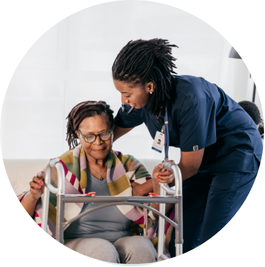Transitional Care Unit (TCU)

Supporting adults to live in the community by providing the help and tools they need. We create care plans and set goals for discharge.
Many patients arriving at TCU have had a health problem that has affected how they function. We assess and find ways to help you return home. We also offer resources and support.
Roles of the Healthcare Team
Patients / Families: Our health care team sees patients and their families as a big part of the program process and will work to help you reach your goals.
Nursing and Health Care Aide (HCA) Care: Nurses and HCAs care for your personal and medical needs while helping you to be independent. They will teach you how to handle your health needs when you go home.
Therapy Services: The Physiotherapist (PT) and the Occupational Therapist (OT) may work with you to make a plan that helps you reach your goals and improves how you function. A Rehabilitation Assistant (RA) may help you with the exercise routines and daily tasks outlined in the plan. The PT and OT may also suggest equipment to help you once you’re back home.
Social Work (SW): The Social Worker can help you deal with emotional and social challenges during this time. They can help you plan for leaving the unit including sorting out money and legal issues and finding community resources.
Home Care: The Hospital-Based Case Coordinators (HBCCs) work closely with you, your family, the healthcare team, and your home care team in the community to make a plan that will support your return home.
Leadership: The Manager of Health Services is responsible for the care and services provided on each unit. They work with the healthcare tam to make sure your needs are met.
Other Therapeutic Services Available for Consultation
Pharmacy: The Pharmacist will review your medications to make sure you are taking the right ones in the correct amount. They can also answer any questions you have about your medications.
Clinical Nutrition: We conduct nutrition screening to find out which patients need help from a Registered Dietitian (RD). Eating well and staying hydrated can help with healing, recovery and managing chronic diseases. It also provides the energy and strength required for the program.
Respiratory Therapy: Respiratory Therapists (RTs) assist people who use oxygen therapy, CPAP / BIPAP machines or need breathing tests. They will provide teaching and organize home oxygen set up for those who need it.
Speech Language Pathology: Speech Language Pathologists (SLPs) assess and treat swallowing and communication issues.
Spiritual Health: Spiritual Health Practitioners (SHPs) help with your emotional and spiritual needs and can assist in finding meaning and purpose in your life. They offer worship services and smudge ceremonies.
Therapeutic Recreation: Therapeutic Recreational Facilitators organize activities to help patients with their social, emotional, physical and cognitive needs. They do this through group activities and one-on-one sessions.
What to expect during your TCU Stay
Everyone comes to TCU with different needs and goals, but we usually aim for a stay of 40 days. You will see a poster at your bedside with a discharge date on it. For some people, the stay may be shorter or longer. We start thinking about how to get you back home on day one.
The SW will keep you and your family informed and will be a main point of contact when planning for discharge.

You may work with a PT to learn safe ways of moving and activities to maintain strength and mobility.
You may work with the OT to learn different ways of doing activities and will figure out what help you might need for daily tasks. The OT may suggest changes to your home, like moving furniture or purchasing new equipment. When you start, the OT will ask for pictures and measurements of the place you will live when you leave.
Our HBCCs may assess and arrange for support at home (if needed) including HCA and nursing services. Once these services are confirmed, patients are usually discharged within 24-48 hours.
The Long-Term Care Access Centre evaluates if you are suitable for long term care placement and will be involved if the team thinks you may need more care than can be provided in the community.
What you should bring when you are admitted:
- Glasses, hearing aids, hairbrush, toothbrush and toothpaste
- Dentures, denture cleaner and adhesive
- Clothing and footwear comfortable for exercising
- Enough undergarments for daily changes
- Wheelchair, walker, cane (if already using)
- Laundry bag for storing dirty clothing
- Personal items including cell phones, iPads, chargers
Please do not bring valuable items (jewelry, important papers) or large amounts of cash.
Services available for a fee
- Laundry
- Telephone
- Television
- Transportation to personal appointments
Nursing Station Information
Lodge 2 East 204-831-2522
If your phone call is not answered, please leave a detailed message and it will be returned within 24 hours.

